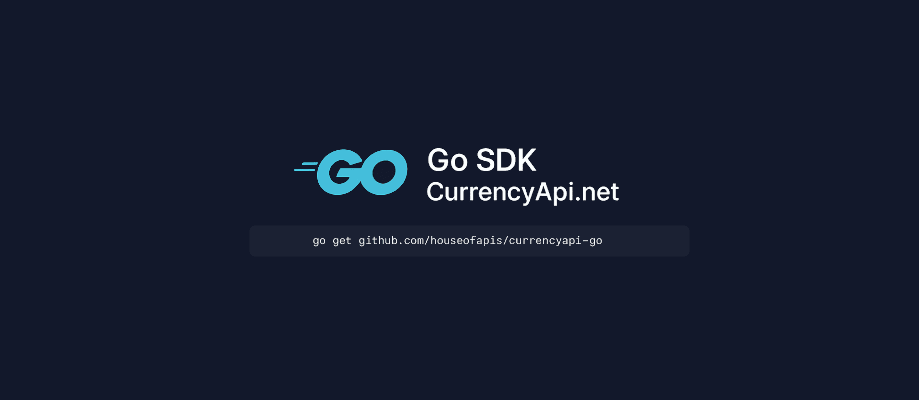Table of Contents
Live Exchange Rates in GoLang – GoLang Currency API SDK

 Written by Oli Girling • Last updated: 21st February 2026 • Read time: 4–8 minutes
Written by Oli Girling • Last updated: 21st February 2026 • Read time: 4–8 minutes Getting live currency rates in GoLang is about to get very simple.
If you're new here, our Currency Exchange API provides lightning‑fast access to exchange rates. With our GoLang SDK you can integrate these live rates into your Go projects in minutes.
Use this guide to get started with our CurrencyApi.net GoLang SDK.
Installing the GoLang SDK
To begin using the CurrencyApi.net GoLang SDK, ensure you have Go installed (version 1.13 or higher). Install the SDK by running the following command:
go get github.com/houseofapis/currencyapi-goThis command downloads the SDK and adds it to your project's dependencies.
Importing the Golang SDK for live currency rates
After installation, import the SDK into your Go project to start using the currency api golang client:
import (
"fmt"
"encoding/json"
"github.com/houseofapis/currencyapi-go"
) Let's add fmt for logging and encoding/json to be able to parse the JSON response from our Currency API.
Instantiating the Golang Client
To start using the package, create a new client instance by providing your API key:
client := currencyapi.Client('YOUR_API_KEY')Need an API Key?
Start building your next project with our GoLang SDK. Get started with a free API key and start building your next project.
Fetching Live Currency Rates Using Go
Our most common endpoint for developers is our Rates endpoint. Here's how you can retrieve live currency rates using our Go SDK
Firstly, let's create a Struct to handle our JSON response:
type JsonResponse struct {
Valid bool
Result map[string]interface{}
Error *struct {
Code int
Message string
}
}Then let's setup some parameters and get some live currency API data using Go.
package main
import (
"fmt"
"encoding/json"
"github.com/houseofapis/currencyapi-go"
)
type JsonResponse struct {
Valid bool
Result map[string]interface{}
Error *struct {
Code int
Message string
}
}
func main() {
client := currencyapi.Client("YOUR_API_KEY")
ratesParams := map[string]string{
"output": "JSON",
"base": "USD",
}
body, err := client.Rates(ratesParams)
var response JsonResponse
if nil != json.Unmarshal(body, &response) {
fmt.Println("Error parsing JSON: ", err)
return
}
if response.Valid {
fmt.Printf("1 USD = %f EUR\n", response.Result["EUR"])
} else {
fmt.Printf("API returned error: Code: %d, Message: %s\n", response.Error.Code, response.Error.Message)
}
}Fantastic. Our first live currency rates using Go. The above code fetches the latest exchange rates with USD as the base currency and outputs what the value in EUR is today.
Available Parameters for Rates Endpoint - Go SDK
| Method | Description |
|---|---|
base | Sets the base currency for conversions. This will output all currency conversions for that currency. Default is USD. |
output | Specifies the response format: JSON or XML. Default is JSON. |
Currency Conversion with GoLang SDK
With our API and Go SDK you can convert currency amounts from one currency to another. This is great for just converting the currencies you need.
The response of the Convert endpoint is slightly different to the Rates endpoint, so we should create a new Struct.
type JsonResponse struct {
Valid bool
Conversion map[string]interface{}
Error *struct {
Code int
Message string
}
}This Struct targets the conversion key inside the JSON response.
// ... use the same imports from above
type JsonResponse struct {
Valid bool
Conversion map[string]interface{}
Error *struct {
Code int
Message string
}
}
func main() {
client := currencyapi.Client("YOUR_API_KEY")
convertParams := map[string]string{
"output": "JSON",
"from": "USD",
"to": "GBP",
"amount": "15.99",
}
body, err := client.Convert(convertParams)
var response JsonResponse
if nil != json.Unmarshal(body, &response) {
fmt.Println("Error parsing JSON: ", err)
return
}
if response.Valid {
fmt.Printf("%f %s = %f %s\n", response.Conversion["amount"], response.Conversion["from"], response.Conversion["result"], response.Conversion["to"])
} else {
fmt.Printf("API returned error: Code: %d, Message: %s\n", response.Error.Code, response.Error.Message)
}
}And there you have it, converted from USD to GBP on the fly using our currency API SDK for Golang.
Available Methods for Convert Endpoint
| Method | Description |
|---|---|
amount | The value of the currency you want to convert from. This should be a number and can contain a decimal place. Required. |
from | The currency you want to convert from. This will be a three-letter ISO 4217 currency code. Required. |
to | The currency you want to convert to. This will be a three-letter ISO 4217 currency code. Required. |
output | Specifies the response format: JSON or XML. Default is JSON. |
Accessing Historical Currency Rates in GoLang
Retrieve historical currency rates can be a super useful for tracking the history of various currency conversions.
With each request you supply a given date, in the example format 2019-01-01, and all currency conversions of a given currency are returned.
We can use the same style Struct as our Rates endpoint, but with a small tweak to include the historical date.
// ... use the same imports from above
type JsonResponse struct {
Valid bool
Date string // added Date here
HistoricalRates map[string]interface{}
Error *struct {
Code int
Message string
}
}
func main() {
client := currencyapi.Client("YOUR_API_KEY")
historicalParams := map[string]string{
"output": "JSON",
"base": "GBP",
"date": "2019-01-01",
}
body, err := client.History(historicalParams)
var response JsonResponse
if nil != json.Unmarshal(body, &response) {
fmt.Println("Error parsing JSON: ", err)
return
}
if response.Valid {
fmt.Printf("1 GBP = %f JPY on %s\n", response.HistoricalRates["JPY"], response.Date)
} else {
fmt.Printf("API returned error: Code: %d, Message: %s\n", response.Error.Code, response.Error.Message)
}
}It is as simple as that. We have historical data on a wide range of currencies going back to the year 2000!
Available Parameters for Historical Endpoint - Go SDK
| Method | Description |
|---|---|
date | The historical date you wish to receive the currency conversions for. This should be formatted as YYYY-MM-DD. Required. |
base | Sets the base currency for conversions. Default is USD. |
output | Specifies the response format: JSON or XML. Default is JSON. |
Accessing Live Currency Rates Within a Timeframe
If you need to access currency rates between a specific time frame, you can use our timeframe endpoint. This timeframe can be up to a year long.
We are going to need a slightly different Struct as each day in between the start and end date will supply a different object.
// ... use the same imports from above
type JsonResponse struct {
Valid bool
StartDate string
EndDate string
TimeframeRates map[string]map[string]float64
Error *struct {
Code int
Message string
}
}
func main() {
client := currencyapi.Client("YOUR_API_KEY")
timeframeParams := map[string]string{
"output": "JSON",
"base": "GBP",
"start_date": "2019-01-01",
"end_date": "2019-01-02",
}
body, err := client.Timeframe(timeframeParams)
var response JsonResponse
if nil != json.Unmarshal(body, &response) {
fmt.Println("Error parsing JSON: ", err)
return
}
if response.Valid {
for date, rates := range response.TimeframeRates {
fmt.Printf("Date: %s\n", date)
for currency, rate := range rates {
fmt.Printf("Currency: %s, Rate: %f\n", currency, rate)
}
}
} else {
fmt.Printf("API returned error: Code: %d, Message: %s\n", response.Error.Code, response.Error.Message)
}
}The API returns multiple days of currency rates in a single response, making it easy to build applications that track currency rates over time.
Available Parameters for Timeframe Endpoint - Go SDK
| Method | Description |
|---|---|
start_date | The start date for the time frame. Format: YYYY-MM-DD. Required. |
end_date | The end date for the time frame. Format: YYYY-MM-DD. Required. |
base | Sets the base currency for conversions. Default is USD. |
output | Specifies the response format: JSON or XML. Default is JSON. |
Fetching OHLC Data with GoLang
The OHLC endpoint gives you access to Open, High, Low, Close price data for a currency pair on a specific date — ideal for technical analysis, trading charts, and backtesting.
This endpoint was introduced in API v2 and is only available on the Professional plan.
Note that OHLC data is only available for dates within the last 30 days. Requesting a date older than that will return an error.
We'll need a Struct to handle the OHLC response, which returns an array of candles:
// ... use the same imports from above
type OhlcCandle struct {
Start string
Open float64
High float64
Low float64
Close float64
}
type JsonResponse struct {
Valid bool
Base string
Quote string
Date string
Ohlc []OhlcCandle
Error *struct {
Code int
Message string
}
}
func main() {
client := currencyapi.Client("YOUR_API_KEY")
ohlcParams := map[string]string{
"output": "JSON",
"currency": "EUR",
"date": "2026-02-21",
"base": "USD",
"interval": "1d",
}
body, err := client.Ohlc(ohlcParams)
var response JsonResponse
if nil != json.Unmarshal(body, &response) {
fmt.Println("Error parsing JSON: ", err)
return
}
if response.Valid {
for _, candle := range response.Ohlc {
fmt.Printf("Open: %f, High: %f, Low: %f, Close: %f\n", candle.Open, candle.High, candle.Low, candle.Close)
}
} else {
fmt.Printf("API returned error: Code: %d, Message: %s\n", response.Error.Code, response.Error.Message)
}
}The API returns an array of OHLC candles for the requested date and interval, making it easy to feed data directly into charting or analytics pipelines.
Available Parameters for OHLC Endpoint - Go SDK
| Method | Description |
|---|---|
currency | The target currency code to get OHLC data for (e.g., EUR, GBP, BTC). Required. |
date | The date you wish to retrieve OHLC data for. Format: YYYY-MM-DD. Must be within the last 30 days. Required. |
base | The base currency for the pair (e.g., USD, EUR). Default is USD. |
interval | Time interval for OHLC candles. Allowed values: 5m, 15m, 30m, 1h, 4h, 12h, 1d. Default is 1d. |
output | Specifies the response format: JSON or XML. Default is JSON. |
Error Handling In Golang
In Golang, we use the error type to handle errors. This allows us to gracefully handle errors and provide meaningful error messages to the user.
You can see from the examples above, it's not only important to check the error from the API, it's also important to handle JSON parsing errors and the request itself.
Best Practices using Golang SDK
To optimize your use of the CurrencyApi.net GoLang SDK, consider the following best practices:
- Implement caching to minimize API calls and improve performance.
- Validate API responses to ensure data integrity.
- Store your API key securely using environment variables or a secure configuration file.
- Stay updated with the SDK documentation for new features and updates.
- Always check for errors after making API calls to handle any issues that may arise.
Handling Responses from the Golang SDK
JSON Response in Go
By default, the SDK returns responses in JSON format. You can parse the JSON response into Go structs for easier data manipulation.
XML Response in Go
To receive responses in XML format, specify the output parameter as 'XML':
params := map[string]string{
"output": "XML", // or "JSON"
"base": "USD",
}
body, err := client.Rates(params)You can then process the XML response using Go's XML parsing libraries.
Conclusion
The GoLang SDK for CurrencyApi.net provides a powerful and efficient way to integrate live currency rates into your Go applications. With straightforward methods and comprehensive support, you can enhance your financial applications with real-time data seamlessly.
Other Useful Links:
Explore Other SDKs
Not using GoLang? Check out our other SDKs below:
Python SDK
Integrate our Currency API into your Python applications with ease. Access live exchange rates and perform currency conversions effortlessly.
Explore the Python SDK →NodeJs SDK
Enhance your NodeJs applications with real-time currency data. Our SDK offers seamless integration and powerful features.
Discover the NodeJs SDK →PHP SDK
Connect to our Currency API from your PHP projects effortlessly. Stay updated with the latest currency rates and conversions.
Check out the PHP SDK →Grab an API key and get coding with GoLang today!
Use our GoLang SDK to integrate live currency rates into your GoLang applications.